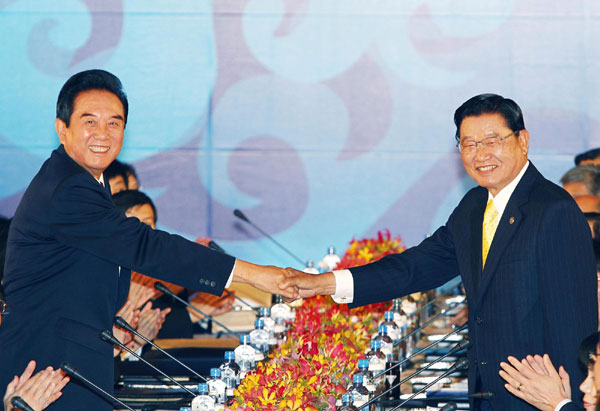TAIPEI - Top envoys from the mainland and Taiwan signed a deal on medical cooperation and discussed investment protection during talks on Tuesday in Taipei, capping a year of unprecedented progress in bilateral ties.

Chen Yunlin (L), president of the mainland-based Association for Relations Across the Taiwan Straits (ARATS), shakes hands with Taiwan-based Straits Exchange Foundation (SEF) Chairman Chiang Pin-kung during a cross-Straits meeting in Taipei Dec 21, 2010. [Photo/Agencies]
"Regular talks between the two sides guarantee peace and prosperity in the Taiwan Straits and the region," said Chiang Pin-kung, chairman of the Taiwan-based Straits Exchange Foundation (SEF), at the start of the meeting.
Sitting across from Chiang was Chen Yunlin, president of the mainland's Association for Relations Across the Taiwan Straits (ARATS), who arrived in Taipei on Monday for what appears to have become a traditional year-end trip to the island.
ARATS and SEF are semi-official bodies authorized to handle cross-Straits affairs in the absence of official ties between Taiwan and the mainland.
The pact is the 15th commercial agreement the two sides have struck since Ma Ying-jeou took over as Taiwan's leader in May 2008, promising to improve relations with the mainland.
The new medical agreement will facilitate cross-Straits exchanges of information on epidemics and cooperation in the development of vaccines to counter any outbreak.
The deal will also allow the two sides to work together on clinical trials of new drugs by adopting the same trial standards.
Taiwan's budding biotechnology industry has been limited by the island's small market, and the new pact is expected to help accelerate the entry of Taiwan products into the lucrative mainland market.
Chiang said the pact will be a key part of the "safety net" between the island and the mainland.
The agreement, along with the previously signed farm product inspection and quarantine agreement and a food safety deal, form the safety net, Chiang told reporters.
He said the medical cooperation agreement concerns people's health and protects consumer rights on both sides.
It will boost the growth of the medical sector, promote research and development of new drugs and generally make medical cooperation easier, he said.
Chen said cross-Straits medical cooperation is urgently needed "given the increasing number of people and goods traveling across the Straits".
"I believe more and more Taiwan people will support negotiations between our two associations," he said.
Wang Hailiang, a researcher with the Taiwan Studies Center at the Shanghai Academy of Social Sciences, said the deal is "a timely response" to the need of mainland-based Taiwan investors, who have found their economic activities in some way being impeded by insufficient public service.
Inadequate medical services for Taiwan people living in the Pudong New Area of Shanghai - home to more than 40,000 Taiwan residents - has affected the investment and living environment of the municipality, according to a report published by the Taiwan affairs office of the Pudong New Area.
The report also suggested the current medical system on the mainland, characterized by insufficient clinics and overburdened large-scale hospitals, offers a chance for the island's medical service providers to expand their business with their advantages in running small clinics.
At the meeting table, the two delegations discussed the need for a future agreement on investment protection.
"To further improve the investment environment, we made definite progress and will continue to work in the field and sign an agreement soon," said Zheng Lizhong, deputy head of the mainland delegation.
Taiwan has been a major investor in the mainland in recent years, providing more than $100 billion in financing, according to some estimates, as well as crucial technological know-how.
The mainland has been Taiwan's largest trading partner and export market since 2007, according to statistics released by both sides.
Zhang Zhouyuan, president of the Taiwan Merchants Association in Shenzhen, said disputes between Taiwan investors and local authorities are on the rise, mostly caused by local authorities' inconsistent policies and Taiwan businessmen being unaware of changes in policy.
"For instance, factory owners have to acquire approval from district authorities for land use, while in the past they only needed authorization at the village level," he said.
The signing of the medical cooperation agreement came after the two sides inked the Economic Cooperation Framework Agreement, a landmark economic pact, which took effect in September, aimed at deepening cooperation and slashing duties.
The three-day negotiation marked the sixth round of talks between the SEF and ARATS in the two years after they resumed talks in June 2008 after a nine-year suspension.